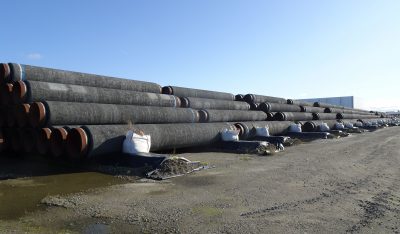Two U.S. Senators Determined to Stop Nord Stream 2 by Imposing Extra Sanctions

The Nord Stream 2 project involves the construction of two gas pipelines with a total capacity of 55 billion cubic meters of gas per year from Russia to Germany via the Baltic Sea. The gas pipeline will run through the territorial waters or exclusive economic zones of Russia, Finland, Sweden, Denmark and Germany. However, this gas pipeline is strengthening Russia’s relations with European states, making the U.S. desperate to end the project.
As reported by Bloomberg on Wednesday, U.S. senators are planning to extend sanctions against the Nord Stream 2 project. Sanctions are expected to target insurance companies associated with the project.
Senator Ted Cruz led the charge against Moscow and said the Russian pipeline is “a critical threat to America’s national security and must not be completed.” He added that Russian President Vladimir Putin is trying to circumvent the sanctions passed by Congress last year. He of course did not explain how a Russian pipeline a continent away from the U.S. and in northern Europe could impact their security.
Cruz, a Republican, was joined by Senator Jeanne Shaheen, a New Hampshire Democrat, who said that the pipeline “threatens Ukraine, Europe’s energy independence and gives Russia an opening to exploit our allies” and that “Congress must once again take decisive action and stand in this pipeline’s path.” He, just like Cruz, did not explain exactly how the pipeline is a threat or security concern, especially against Ukraine.
The pipeline does not threaten Europe’s energy independence, and rather, as is enshrined in a free market economy that the U.S. says it ardently defends, allows Europe to have another option for gas. Although Russian gas already reaches Europe, it goes via Ukraine that is volatile and a high risk for Russia. The Director General of the Ukrainian gas transportation system Sergei Makogon said earlier this year that Ukraine “will make every effort to prevent the completion of Nord Stream 2, as this project has a clear political character and runs counter to European principles of solidarity.”
With Russian gas to Europe at risk, the Nord Stream 2 project ensures Russia’s gas can reach European markets so it can compete with gas from Qatar, the U.S. and other sources. And it is with this that lays the problem for Washington. It is obviously absurd to suggest that Russian gas “threatens Ukraine” or is a “critical threat to America’s national security.” The proposed sanctions, that also has backing from Republican Senators John Barrasso of Wyoming and Ron Johnson of Wisconsin, is just part of “gas wars” initiated by the U.S. to force countries to buy American liquefied natural gas.
It is for this reason that Russian Ambassador to Washington, Anatoly Antonov, said on that the U.S. will not be able to stop the construction of the Nord Stream 2 gas pipeline.
Last week, former U.S. Ambassador to Germany, Richard Grenell, who resigned on June 2, said that new sanctions against Nord Stream 2 could be adopted by the U.S. Congress in an operational mode. Their purpose is to prevent commissioning of the gas pipeline.
At that time, media also swept on the news that an alleged dispute broke out between U.S. President Donald Trump and long-time German Chancellor Angela Merkel because of differences of opinion on the Nord Stream 2 project. However, neither Berlin nor Washington officially confirmed this rumour. Also, at the end of last year, the U.S. adopted a defense budget providing for sanctions on companies involved in laying the gas pipeline. As a result, the Swiss company Allseas stopped work and withdrew its ships. The head of the Ministry of Energy Alexander Nowak said after that Russia is able to complete the project itself however.
The Nord Stream 2 subsidiary, Gazprom Nord Stream 2, is building the gas pipeline. The annual meeting of Gazprom’s board of directors is scheduled for June 11 and it is expected the main topic of talks to be about the impact of Western sanctions on Gazprom and response measures. This is more crucial as now Poland has joined the U.S. in anti-Nord Stream 2 sanctions.
The Polish Office of Competition and Consumer Protection initiated a new proceeding against Gazprom regarding the construction of the Nord Stream 2 gas pipeline, threatening the Russian company with a fine of €50 million. The Polish office demanded that Gazprom provide documents regarding the project, namely contracts concluded between Gazprom’s subsidiary and other companies financing the construction of the gas pipeline. These were primarily contracts for the transmission, distribution, sale, supply and storage of gas fuels. Gazprom did not provide this information, and now Poland aims to fine the company.
Despite these pressures, in which Poland has a very minor part, Russia will unlikely be deterred by threats of sanctions. Russia has already learned long ago how to operate while under sanction and will continue to pursue projects that serve their state interests and integrate Russia closer to Europe. This is especially important as the European countries are more interested in convenient gas that is not only logistically easier, but cheaper than many other alternatives.
*
Note to readers: please click the share buttons above or below. Forward this article to your email lists. Crosspost on your blog site, internet forums. etc.
This article was originally published on InfoBrics.
Paul Antonopoulos is an independent geopolitical analyst.

